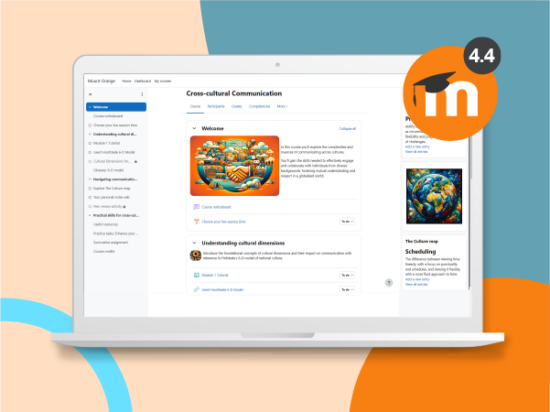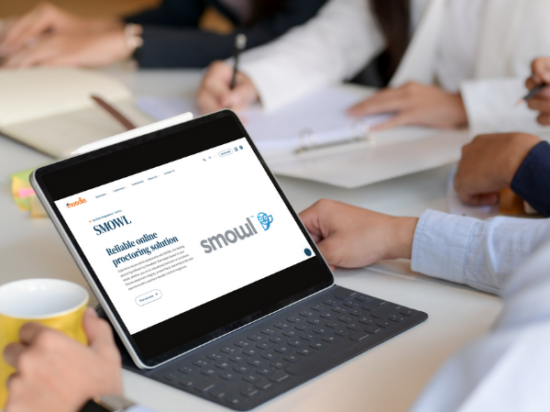Bjørn Torleif Lia is an experienced consultant working with aiLæring, an industry platform for effective skills development for employees and job seekers in Norway. He works for Telemark Kompetanse, an expert organisation that helps municipalities, companies, and organisations with e-learning, digital competence planning, and learning management platforms. Recently, Sonya Trivedi from Moodle HQ had a conversation with Bjørn to gain insights about effective workplace training.
Hi Bjørn, could you start by explaining your area of expertise?
Telemark Kompetanse helps organisations adopt learning platforms in their employee training. My key role is to work with clients to implement their technical solutions.
For a large part of my career, I have had experience with Moodle LMS and its plugins, but starting in 2021, we began implementing Moodle Workplace. We use the platform with around 40 clients in Norway.
During MoodleMoot Global 2023, you shared an interesting success story about facilitating and sustaining employee training in a company with over 600 employees. Could you tell us more about this project?
Yes, this was a project for Fretex Norway, a social enterprise that provides waste management, recycling, and vocational training services, focusing on supporting people in vulnerable situations by offering them employment opportunities and job training. We collaborated closely with Sissel Rogne, who led it on behalf of Fretex and Moodle Premium Certified Partner, eFactor Norway. Efaktor contributed a lot to the work of finding good solutions, resulting in significant time savings and automation of many tasks for the client, which would have otherwise been time-consuming and complex.
Moodle Workplace is an ideal platform to address the challenges of training a widespread workforce. Fretex’s mission is to offer employment opportunities and enhance environmental sustainability through reuse initiatives. As the largest work inclusion organisation and secondhand chain in Norway, their operations are significant, spanning from the north to the south of the country. The training strategy integrated Moodle’s capabilities with specific customisations to meet Fretex’s unique organisational needs. They had a specific requirement that the trainer in one course only see the submissions and feedback from the employees who signed up for this training. Another requirement was that the Department Lead have access to all the submissions in every training program course. Moodle Workplace was able to accommodate these requirements through its unique features.
How did Moodle Workplace’s features benefit Fretex?
Moodle Workplace enabled Fretex to offer continuous, accessible learning opportunities, supporting professional growth and skill development across the organisation. The platform’s flexibility allowed for the creation of tailored training modules, addressing the specific needs of various employee groups, from leadership to new hires. The trainers in each course were able to see their own learners’ progress while they were active, and they were not limited by tracking the employees only when they completed the course.
The technical adaptations and customisations made to Moodle Workplace to fit Fretex’s organisational structure and training needs highlighted the platform’s versatility and capability to address complex training requirements. The system’s design incorporated mechanisms for collecting and acting on participant feedback, facilitating ongoing improvement of training content and delivery.
Last but not least, by minimising the need for travel and optimising resource use, the training strategy supported Fretex’s commitment to environmental sustainability and its social inclusion mission.
Could you please share some of the features you used to measure the effectiveness of employee training initiatives?
To enhance the effectiveness of Fretex’s employee training initiatives, we implemented custom pages specifically designed for managers. They featured a dashboard that offered managers a comprehensive overview of their team’s training activities. Through this dashboard, managers were able to easily see which training programs their employees were enrolled in and monitor their progress. This functionality served as an invaluable tool for managers to keep track of and document the training undertaken by their team members. Custom pages also provide the opportunity for site and tenant administrators to create personalised experiences for different audiences by easily adding new pages to the navigation. The content on these pages can be customised using standard Moodle Workplace blocks.
Leveraging Moodle Workplace’s Dynamic Rules, we also streamlined the process of assigning training programs. Dynamic rules allow organisations to define and execute centralised and automated rules using an “if this, then that” conditional approach to trigger actions when certain conditions are met. These rules automatically allocated programs to employees based on the organisational structure and their specific job positions, greatly enhancing the efficiency and reliability of our training initiatives. This automation significantly reduced the administrative burden, allowing us to allocate our resources more effectively.
Furthermore, we utilised Moodle Workplace’s custom report feature to generate tailored reports for managers. These reports were accessible directly within their dashboard, providing them with detailed insights into their team’s training performance. The custom reporting capability enabled managers to make informed decisions about future training needs and interventions, ensuring that the training initiatives were as effective and impactful as possible.
Lastly, please share some important insights or advice for organisations looking to leverage Moodle Workplace for their employee training.
I could offer a wealth of insights on this topic, but I’ll start with a key aspect that stands out: integration compatibility. This is crucial, especially since many organisations we collaborate with are keen to sync their organisational structures and roles from a centralised system. This need is prevalent in our market and consistently ranks high on our client’s priority list. Our experience has shown that integrations with Moodle Workplace are notably effective.
The ability of a Learning Management System (LMS) to seamlessly create user profiles and accurately assign them according to their roles within the platform is invaluable.
By joining the creation of user profiles with appropriate job allocations, you can develop detailed learning pathways and certifications tailored to specific groups within your organisation. This approach not only allows for the customisation of learning experiences but also significantly streamlines the process of assigning these pathways to individuals based on their organisational roles.
This capability ensures a highly targeted and efficient training delivery, making it possible to automatically align learning initiatives with each employee’s specific needs and positions. Such a system enhances the relevance and impact of training programs and contributes to a more structured and coherent organisational learning environment.
………………………….
We enjoyed hearing Bjørn’s insights about effective workplace training through the use of Moodle Workplace in Norway. It’s great to understand how our users utilise the platform for all their training needs.



